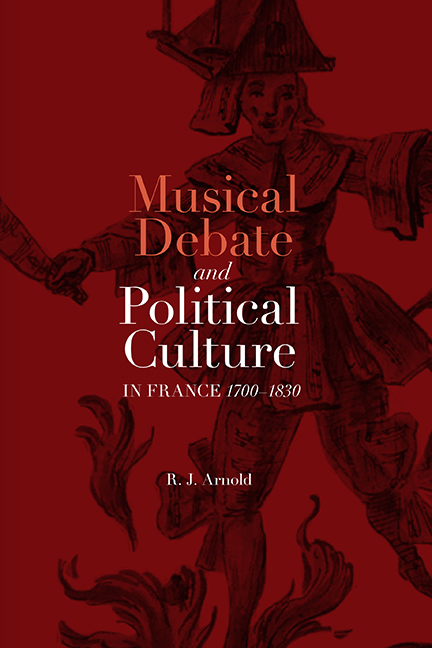Book contents
- Frontmatter
- Contents
- List of Illustrations
- Introduction
- 1 Parallels, Comparisons and Ripostes: The Raguenet–Lecerf Controversy, 1702–32
- 2 Spectators, Satirists and Sectarians: The Ramiste–Lulliste Querelle, 1733–51
- 3 'A Vast Negotiation': The Querelle des Bouffons, 1752–54
- 4 The Spirit of Contradiction: The Gluckiste–Piccinniste Querelle, 1774–88
- 5 A Revolutionary Interlude: 1789–1800
- 6 The End of the Party: New Avenues for Musical Dispute, 1800–30
- Conclusion
- Select Bibliography
- Index
- Music in Society and Culture
6 - The End of the Party: New Avenues for Musical Dispute, 1800–30
Published online by Cambridge University Press: 29 May 2021
- Frontmatter
- Contents
- List of Illustrations
- Introduction
- 1 Parallels, Comparisons and Ripostes: The Raguenet–Lecerf Controversy, 1702–32
- 2 Spectators, Satirists and Sectarians: The Ramiste–Lulliste Querelle, 1733–51
- 3 'A Vast Negotiation': The Querelle des Bouffons, 1752–54
- 4 The Spirit of Contradiction: The Gluckiste–Piccinniste Querelle, 1774–88
- 5 A Revolutionary Interlude: 1789–1800
- 6 The End of the Party: New Avenues for Musical Dispute, 1800–30
- Conclusion
- Select Bibliography
- Index
- Music in Society and Culture
Summary
IN 1800, not long after Méhul had noted his ideas for reform, a comedy performed in Paris appeared to indicate that nothing essential had changed. L’Apollon du Belvéder, a ‘folie-vaudeville-impromptu’ put together by a team of young authors, was another satirical exploration of the familiar theme of the mélomane. This time, uniquely in the genre, the obsessive character was a woman, Madame Despritvieux, a salonnière who kept a stable of modish artists; one of her protégés, the composer Tromboner, was planning a three-day-long opéra comique on the subject of the battle of Jericho, a work on such a lavish scale that it would require the construction of a new theatre. Despritvieux had acquired, through the agency of a broker of antiquities, a talking statue of Apollo; in fact, the broker was the suitor of her daughter, Apolline, and the statue was his valet in disguise. When Tromboner asked Apollo to confirm which musician best embodied the spirit of the day, the statue admonishingly replied ‘Grétry’. ‘That judgement astonishes me,’ gasped Tromboner: ‘I make a hundred times more noise than him.’ The comedy was dedicated to Grétry, who attended the first night at the Théâtre des Troubadours amid much flattering ceremonial, and who wrote the authors a kind letter of thanks.
The impression given by L’Apollon du Belvéder was of a gleeful reawakening of the practice of querelle to suit the preoccupations of post-Revolutionary France. The authors made every effort to incorporate allusions to the crazes of the day, including the magnificent Andalucian horses presented to Napoleon by the Spanish king; the goings-on at the Salon; and the classical statuary of the Louvre, which had reopened earlier the same month with a display of antiquities looted from Italy. The role of the statue of Apollo was a clear reference to this topical theme; the idea that it could talk was borrowed from another current sensation, the ventriloquist bust of Trophonius exhibited in the ‘Salon Acoustique’ of the scientist and showman Jacques-Alexandre-César Charles. Scarcely a line of the play passed without some reference, often highly derogatory, to a play or opera of the day; and the spirit of combative commentary extended even to the authors’ preface, which was used to get their own back for the ‘insults of certain pygmies’ in the periodical press.
- Type
- Chapter
- Information
- Musical Debate and Political Culture in France, 1700–1830 , pp. 177 - 208Publisher: Boydell & BrewerPrint publication year: 2017



